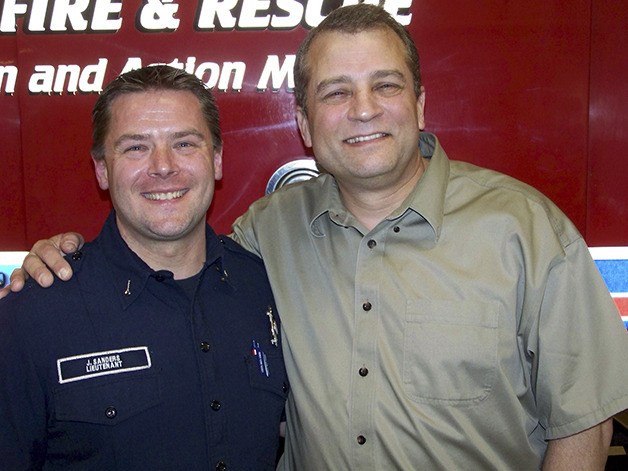National CPR/AED Awareness Week is June 1 through June 7. The following is from an East Pierce Fire and Rescue press release:
Dave Wagner died five times on March 19 after suffering a type of heart attack called the “widow maker.” Three days later, he was discharged from the hospital with only minimal damage to his heart and is back to leading a normal life with his family. His decision to call 911 saved his life.
“If that hadn’t happened, he would have died while his wife was driving him to the hospital and his story would have had a completely different ending,” said East Pierce Fire and Rescue Battalion Chief Jeff Moore.
According to Wagner, age 55, he had just returned home from work when he began to feel pressure in his chest. At first he asked his wife to take him to the hospital. But as the pain radiated to his jaw, he said, “Call 911. I think I’m having a heart attack.”
East Pierce crews arrived and began their assessment. Lieutenant paramedic Jason Sanders read Wagner’s EKG and knew his patient was in trouble. On the way to the hospital, Wagner remembers Sanders telling him, “Dave, I need you to talk to me.” Wagner replied, “Okay,” then went into cardiac arrest.
Wagner went into cardiac arrest two more times on the way to the hospital and twice once he arrived. But he is one of the lucky ones because his wife called 911.
“Unfortunately, many people don’t recognize the signs and symptoms of a heart attack and fail to call 911,” said Moore. “Going by car to the hospital puts loved ones in a horrible position if the person goes into cardiac arrest … driving yourself puts everyone on the road at risk.”
Calling 911 is the first step in activating a comprehensive system of care. “We’ve worked hard with other agencies, including Good Samaritan Hospital, to develop this system of care,” said McCallion. “Our motto is: ‘When in doubt, check it out.’ We can wirelessly send an EKG to the cardiologists and confer with them. If you need to go to the hospital, we will take you. If not, no harm done.”
Treatment for many heart attacks involves opening blocked arteries in a catheterization laboratory or cath lab. The paramedics can call ahead, so the cath lab can be prepped and the team is assembled prior to the patient’s arrival. It’s especially important late at night when the team may be coming from home.
Not every hospital has the facilities to treat patients who are suffering from a heart attack. Patients who arrive at a hospital with no cath lab must be transported to a hospital that does.
Residents who live within the East Pierce Fire and Rescue service area, which includes Bonney Lake, Sumner, South Prairie, Wilkeson, Milton, Edgewood and Lake Tapps, pay no out-of-pocket expenses for ambulance transport. The fire department will bill private insurance companies and Medicare and Medicaid to reimburse costs.
“It’s important to know the symptoms of a heart attack,” Moore said. “Chest pain or pressure may not be the primary symptom, or even present at all.” Other common symptoms of a heart attack include:
• unexplained shortness of breath;
• dizziness or weakness; and
• shoulder, arm pain or upper back pain.
“Women are less likely to have chest pain,” he said. ”Instead, they may experience pain or pressure in their upper abdomen, where it’s often confused with indigestion.”
“The key is to call early. Every minute that passes, heart tissue is being damaged. Getting treatment sooner means less heart damage and a better outcome,” Moore said. Something Wagner knows firsthand. “My first instinct was to have [my wife] take me to the hospital,” he said. “As things worked out, if she would have taken me, I would have flat-lined and likely died in the car on the way.”
Earlier this month, East Pierce Fire and Rescue was selected from among fire departments throughout the United States to receive the 2013 Heart Safe Community Award in the small community category (population less than 100,000) from the International Association of Fire Chief’s EMS Section and Physio-Control, Inc. The annual award recognizes organizations with creative approaches to implementing and maintaining systems to prevent and treat cardiac-related diseases within their communities.
East Pierce was selected for the efforts the department has made over the past two years to implement a comprehensive cardiac arrest resuscitation program that has significantly improved survival rates within the community. The department reports that cardiac arrest survival for witnessed ventricular fibrillation patients has climbed from 10 percent (2006-2010 average) to 41 percent in 2011 and 2012.
The sweeping program included implementation of “high-performance” CPR training for the firefighters, quality improvement programs, debriefs following all cardiac arrest calls, automated external defibrillators—commonly referred to as “AEDs”—for police officers, a new, Hands-Only CPR program and participation in a state-wide cardiac arrest registry that allows the department to compare itself to others in the state.
Recently, Wagner and his family stopped by the fire station to thank Sanders and the rest of the crew.
“I have a real respect and love for this man.” Wagner said of Sanders. “It was obvious he was not going to give up on me and that he would do everything in his power to save my life. I am so grateful to God and for these guys who work tirelessly to save lives.”


